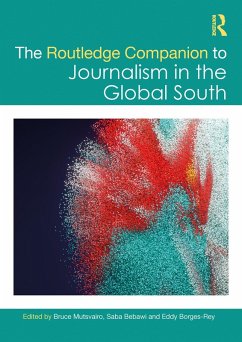The Routledge Companion to Journalism in the Global South (eBook, PDF)
Redaktion: Mutsvairo, Bruce; Borges-Rey, Eddy; Bebawi, Saba
46,95 €
46,95 €
inkl. MwSt.
Sofort per Download lieferbar

23 °P sammeln
46,95 €
Als Download kaufen

46,95 €
inkl. MwSt.
Sofort per Download lieferbar

23 °P sammeln
Jetzt verschenken
Alle Infos zum eBook verschenken
46,95 €
inkl. MwSt.
Sofort per Download lieferbar
Alle Infos zum eBook verschenken

23 °P sammeln
The Routledge Companion to Journalism in the Global South (eBook, PDF)
Redaktion: Mutsvairo, Bruce; Borges-Rey, Eddy; Bebawi, Saba
- Format: PDF
- Merkliste
- Auf die Merkliste
- Bewerten Bewerten
- Teilen
- Produkt teilen
- Produkterinnerung
- Produkterinnerung

Bitte loggen Sie sich zunächst in Ihr Kundenkonto ein oder registrieren Sie sich bei
bücher.de, um das eBook-Abo tolino select nutzen zu können.
Hier können Sie sich einloggen
Hier können Sie sich einloggen
Sie sind bereits eingeloggt. Klicken Sie auf 2. tolino select Abo, um fortzufahren.

Bitte loggen Sie sich zunächst in Ihr Kundenkonto ein oder registrieren Sie sich bei bücher.de, um das eBook-Abo tolino select nutzen zu können.
The Routledge Companion to Journalism in the Global South examines the deep-seated challenges associated with the historical imposition of Western journalism standards on constituencies of the Global South.
- Geräte: PC
- mit Kopierschutz
- eBook Hilfe
Andere Kunden interessierten sich auch für
![The Routledge Companion to Journalism in the Global South (eBook, ePUB) The Routledge Companion to Journalism in the Global South (eBook, ePUB)]() The Routledge Companion to Journalism in the Global South (eBook, ePUB)46,95 €
The Routledge Companion to Journalism in the Global South (eBook, ePUB)46,95 €![Challenges and New Directions in Journalism Education (eBook, PDF) Challenges and New Directions in Journalism Education (eBook, PDF)]() Challenges and New Directions in Journalism Education (eBook, PDF)37,95 €
Challenges and New Directions in Journalism Education (eBook, PDF)37,95 €![The Routledge Companion to News and Journalism (eBook, PDF) The Routledge Companion to News and Journalism (eBook, PDF)]() The Routledge Companion to News and Journalism (eBook, PDF)46,95 €
The Routledge Companion to News and Journalism (eBook, PDF)46,95 €![Milestones in Digital Journalism (eBook, PDF) Milestones in Digital Journalism (eBook, PDF)]() Milestones in Digital Journalism (eBook, PDF)37,95 €
Milestones in Digital Journalism (eBook, PDF)37,95 €![Disrupting Mainstream Journalism in India (eBook, PDF) Disrupting Mainstream Journalism in India (eBook, PDF)]() Kalyani ChadhaDisrupting Mainstream Journalism in India (eBook, PDF)21,95 €
Kalyani ChadhaDisrupting Mainstream Journalism in India (eBook, PDF)21,95 €![Arab Digital Journalism (eBook, PDF) Arab Digital Journalism (eBook, PDF)]() Noha MellorArab Digital Journalism (eBook, PDF)21,95 €
Noha MellorArab Digital Journalism (eBook, PDF)21,95 €![Digital Journalism in China (eBook, PDF) Digital Journalism in China (eBook, PDF)]() Digital Journalism in China (eBook, PDF)21,95 €
Digital Journalism in China (eBook, PDF)21,95 €-
-
-
The Routledge Companion to Journalism in the Global South examines the deep-seated challenges associated with the historical imposition of Western journalism standards on constituencies of the Global South.
Dieser Download kann aus rechtlichen Gründen nur mit Rechnungsadresse in A, B, BG, CY, CZ, D, DK, EW, E, FIN, F, GR, HR, H, IRL, I, LT, L, LR, M, NL, PL, P, R, S, SLO, SK ausgeliefert werden.
Produktdetails
- Produktdetails
- Verlag: Taylor & Francis eBooks
- Seitenzahl: 516
- Erscheinungstermin: 21. November 2023
- Englisch
- ISBN-13: 9781000935554
- Artikelnr.: 68996051
- Verlag: Taylor & Francis eBooks
- Seitenzahl: 516
- Erscheinungstermin: 21. November 2023
- Englisch
- ISBN-13: 9781000935554
- Artikelnr.: 68996051
- Herstellerkennzeichnung Die Herstellerinformationen sind derzeit nicht verfügbar.
Bruce Mutsvairo is Professor and Chair of Media, Politics, and the Global South at Utrecht University, The Netherlands, where he doubles as UNESCO Chair on Data, Disinformation and Democracy. A former journalist with the Associated Press, he has published numerous scholarly books exploring the development of journalism in non-Western societies. Saba Bebawi is Professor and Head of Discipline for Journalism and Writing in the School of Communication at UTS. She has published on media power and the role of media in democracy-building, in addition to investigative journalism in conflict and post-conflict regions. Eddy Borges-Rey is Associate Professor at Northwestern University in Qatar. His area of academic expertise is digital journalism and emerging media, and his research looks at the interplay between media, technology, and power, particularly around issues in data journalism, critical data, code and algorithm studies, artificial intelligence and automation, mobile journalism, photojournalism, and data and media literacy. Prior to obtaining an MA and PhD in media and communication, Borges-Rey worked as a broadcast journalist, media producer, and PR practitioner for almost 15 years.
List of Figures
List of Tables
List of Contributors
Chapter 1: Regionalizing Journalism
Bruce Mutsvairo, Saba Bebawi and Eddy Borges-Rey
PART I: THEORIZING JOURNALISM IN THE GLOBAL SOUTH
Chapter 2: What Defines Journalism in the Global South? Insights from Latin America
Silvio Waisbord and Adriana Amado
Chapter 3: Terrorist Journalism in the Middle East
Ahmed Al-Rawi
Chapter 4: Poverty News in Latin America: Too Much to See but Too Little and Too Polarized to Say
Jairo Lugo-Ocando
Chapter 5: Theorising Indigenous-Language Journalism in Africa
Abiodun Salawu
Chapter 6: Rethinking African Journalism Cultures in the Context of Global Professional Interdependences
Hayes Mawindi Mabweazara
Chapter 7: The Political Economy of the Xenophobic Lens: Reporting African Migrants on South African Television News
Last Moyo and Allen Munoriyarwa
Chapter 8: Retheorizing African Digital Journalism in the 21st Century Allen Munoriyarwa
Allen Munoriyarwa and Dumisani Moyo
Chapter 9: The Challenge of Competing Loyalties for Journalists in Non-Western Cultures
Terje Skjerdal
PART II: PEDAGOGICAL PARADIGMS
Chapter 10: Deliberation as Pedagogy: Gender, Intersectionality and Journalism Education in India
Preeti Raghunath
Chapter 11: Challenges and Opportunities at Decolonizing the Curriculum: Narratives from Selected Southern African Journalism and Media Schools
Shepherd Mpofu and Trust Matsilele
Chapter 12: Journalism Education in Pakistan: Key Gaps in Curriculum Development
Sadia Jamil and Kriti Bhuju
Chapter 13: The Promises and Limitations of Journalism Education in Ethiopia
Téwodros Workneh
Chapter 14: Piecemeal Pedagogies: Reflecting on the Nature, Context, and Impact of Journalism Training and Education in Malawi and Zambia
Suzanne Temwa Gondwe Harris, Chanda Mfula, Chikumbutso Herbert Manthalu
Chapter 15: Teaching Investigative Journalism in a Transnational University in China
Diana Garrisi and Jiahui Huang
PART III: DIVERSITY OF JOURNALISM PRACTICES
Chapter 16: Constraints on Journalistic Practices in the Arab World Post-Arab Spring and Post-Covid-19
Sahar Khamis
Chapter 17: News Journalism as a Civil Norm Builder in Post-Conflict Settings: The Example of the Daily Nation and The Standard News Reporting after the Kenyan Election Violence, 2007/2008
Stephanie Pukallus and Gemma Horton
Chapter 18: Journalism 2.0, New Practices, and Culture in Nigeria: A Critical Examination of Nigerian Television Authority and Nigeria Info FM
Ufuoma Akpojivi
Chapter 19: Extractivisim and Its Discontents: Al Jazeera English's Coverage of Latin America
Marcela Pizarro Coloma
Chapter 20: Cracks in the Wall: Alternative Journalism in Turkey
Bora Ataman and Baris Çoban
Chapter 21: Contemporary Indian Journalism: Digital Response to Traditional Challenges
Uma Shankar Pandey
Chapter 22: The Day When Maids Went to Disney: Journalism and Neoliberalism in Brazil
José Cláudio Siqueira Castanheira, Melina Santos, and Afonso de Albuquerque
Chapter 23 Contemporary Critiques of Nigerian Journalism
Adeyanju Apejoye
Chapter 24: Reporting the MENA as Conflict: Political Influences, Routine Practices, and Journalists' Struggles in the Field
Claudia Kozman
Chapter 25: Capitalizing the Social Media: Exploring Branding of Indonesian Journalists on Instagram
Indra Prawira and Regita Anggraini Ekaputri
PART IV: PLATFORMS FOR COLLABORATION WITH THE GLOBAL NORTH
Chapter 26: Journalism as a Springboard for Collaboration between Scholars in the Global North and South
Summer Harlow and Ingrid Bachmann
Chapter 27: Collaboration in Journalist Education: Finding Multiple Perspectives through Global Journalism and Local Practices
Kristin Skare Orgeret
Chapter 28: Ethnic Journalism in Russia: Theoretical Approaches for Potential Global Collaboration
Anna Gladkova and Elena Vartanova
Chapter 29: The Challenge of Disinformation in the Portuguese-Speaking African Countries' Journalism
Susana Salgado and Nuno Andrade Ferreira
Chapter 30: Central and Eastern Europe in Journalism Studies: The three-faced disadvantage of underrepresentation, isolation, and Westernization
Gergö HÁLÓ and Márton Demeter
Chapter 31: Ontologies of Journalism: Conceptualizing Objectivity and Emotions in India and the United Kingdom
Antje Glück
Chapter 32 Diaspora Journalism as a Platform for Collaboration between the North and the South
Ola Ogunyemi
PART V: ETHICAL AND OTHER EMERGING JOURNALISM CRITIQUES
Chapter 33: Storytelling in the Age of Data: Data Journalism in Hong Kong
Roselyn Du
Chapter 34: Media Capture: The Conceptual Challenges for Studying Journalism in Transitional Democracies
Mireya Márquez-Ramírez
Chapter 35: Women Journalists in Mexico: They Will Not Silence Our Voices
Yennué Zárate Valderrama
Chapter 36: Unveiling the Master Signifier in Media Ethics Transgressions in South Africa
Glenda Daniels
Chapter 37: De-Westernising Photojournalism: From Photojournalism of the Global South to Photojournalism in the Global South
Saumava Mitra and Brenda Witherspoon
Chapter 38: Evolving Journalism Practices in the Global South: Convergence, Continuities, and Disjuncture
Cleophas Taurai Muneri
Chapter 39: Climate Change Journalism in Pakistan: Ethical Deliberations
Muhammad Ittefaq, Shafiq Ahmad Kamboh and Ayesha Ashfaq
Chapter 40: Journalism in Muslim Societies: Alternative Theories and Practices of Fairness and Justice
Mohammed Musa and Sameera Ahmed
Chapter 41: Conceptual Critiques to African Journalism
Levi Obonyo
Chapter 42: Journalism in Cameroon: A High Risk and Dangerous Profession?
Peter Tiako Ngangum
INDEX
List of Tables
List of Contributors
Chapter 1: Regionalizing Journalism
Bruce Mutsvairo, Saba Bebawi and Eddy Borges-Rey
PART I: THEORIZING JOURNALISM IN THE GLOBAL SOUTH
Chapter 2: What Defines Journalism in the Global South? Insights from Latin America
Silvio Waisbord and Adriana Amado
Chapter 3: Terrorist Journalism in the Middle East
Ahmed Al-Rawi
Chapter 4: Poverty News in Latin America: Too Much to See but Too Little and Too Polarized to Say
Jairo Lugo-Ocando
Chapter 5: Theorising Indigenous-Language Journalism in Africa
Abiodun Salawu
Chapter 6: Rethinking African Journalism Cultures in the Context of Global Professional Interdependences
Hayes Mawindi Mabweazara
Chapter 7: The Political Economy of the Xenophobic Lens: Reporting African Migrants on South African Television News
Last Moyo and Allen Munoriyarwa
Chapter 8: Retheorizing African Digital Journalism in the 21st Century Allen Munoriyarwa
Allen Munoriyarwa and Dumisani Moyo
Chapter 9: The Challenge of Competing Loyalties for Journalists in Non-Western Cultures
Terje Skjerdal
PART II: PEDAGOGICAL PARADIGMS
Chapter 10: Deliberation as Pedagogy: Gender, Intersectionality and Journalism Education in India
Preeti Raghunath
Chapter 11: Challenges and Opportunities at Decolonizing the Curriculum: Narratives from Selected Southern African Journalism and Media Schools
Shepherd Mpofu and Trust Matsilele
Chapter 12: Journalism Education in Pakistan: Key Gaps in Curriculum Development
Sadia Jamil and Kriti Bhuju
Chapter 13: The Promises and Limitations of Journalism Education in Ethiopia
Téwodros Workneh
Chapter 14: Piecemeal Pedagogies: Reflecting on the Nature, Context, and Impact of Journalism Training and Education in Malawi and Zambia
Suzanne Temwa Gondwe Harris, Chanda Mfula, Chikumbutso Herbert Manthalu
Chapter 15: Teaching Investigative Journalism in a Transnational University in China
Diana Garrisi and Jiahui Huang
PART III: DIVERSITY OF JOURNALISM PRACTICES
Chapter 16: Constraints on Journalistic Practices in the Arab World Post-Arab Spring and Post-Covid-19
Sahar Khamis
Chapter 17: News Journalism as a Civil Norm Builder in Post-Conflict Settings: The Example of the Daily Nation and The Standard News Reporting after the Kenyan Election Violence, 2007/2008
Stephanie Pukallus and Gemma Horton
Chapter 18: Journalism 2.0, New Practices, and Culture in Nigeria: A Critical Examination of Nigerian Television Authority and Nigeria Info FM
Ufuoma Akpojivi
Chapter 19: Extractivisim and Its Discontents: Al Jazeera English's Coverage of Latin America
Marcela Pizarro Coloma
Chapter 20: Cracks in the Wall: Alternative Journalism in Turkey
Bora Ataman and Baris Çoban
Chapter 21: Contemporary Indian Journalism: Digital Response to Traditional Challenges
Uma Shankar Pandey
Chapter 22: The Day When Maids Went to Disney: Journalism and Neoliberalism in Brazil
José Cláudio Siqueira Castanheira, Melina Santos, and Afonso de Albuquerque
Chapter 23 Contemporary Critiques of Nigerian Journalism
Adeyanju Apejoye
Chapter 24: Reporting the MENA as Conflict: Political Influences, Routine Practices, and Journalists' Struggles in the Field
Claudia Kozman
Chapter 25: Capitalizing the Social Media: Exploring Branding of Indonesian Journalists on Instagram
Indra Prawira and Regita Anggraini Ekaputri
PART IV: PLATFORMS FOR COLLABORATION WITH THE GLOBAL NORTH
Chapter 26: Journalism as a Springboard for Collaboration between Scholars in the Global North and South
Summer Harlow and Ingrid Bachmann
Chapter 27: Collaboration in Journalist Education: Finding Multiple Perspectives through Global Journalism and Local Practices
Kristin Skare Orgeret
Chapter 28: Ethnic Journalism in Russia: Theoretical Approaches for Potential Global Collaboration
Anna Gladkova and Elena Vartanova
Chapter 29: The Challenge of Disinformation in the Portuguese-Speaking African Countries' Journalism
Susana Salgado and Nuno Andrade Ferreira
Chapter 30: Central and Eastern Europe in Journalism Studies: The three-faced disadvantage of underrepresentation, isolation, and Westernization
Gergö HÁLÓ and Márton Demeter
Chapter 31: Ontologies of Journalism: Conceptualizing Objectivity and Emotions in India and the United Kingdom
Antje Glück
Chapter 32 Diaspora Journalism as a Platform for Collaboration between the North and the South
Ola Ogunyemi
PART V: ETHICAL AND OTHER EMERGING JOURNALISM CRITIQUES
Chapter 33: Storytelling in the Age of Data: Data Journalism in Hong Kong
Roselyn Du
Chapter 34: Media Capture: The Conceptual Challenges for Studying Journalism in Transitional Democracies
Mireya Márquez-Ramírez
Chapter 35: Women Journalists in Mexico: They Will Not Silence Our Voices
Yennué Zárate Valderrama
Chapter 36: Unveiling the Master Signifier in Media Ethics Transgressions in South Africa
Glenda Daniels
Chapter 37: De-Westernising Photojournalism: From Photojournalism of the Global South to Photojournalism in the Global South
Saumava Mitra and Brenda Witherspoon
Chapter 38: Evolving Journalism Practices in the Global South: Convergence, Continuities, and Disjuncture
Cleophas Taurai Muneri
Chapter 39: Climate Change Journalism in Pakistan: Ethical Deliberations
Muhammad Ittefaq, Shafiq Ahmad Kamboh and Ayesha Ashfaq
Chapter 40: Journalism in Muslim Societies: Alternative Theories and Practices of Fairness and Justice
Mohammed Musa and Sameera Ahmed
Chapter 41: Conceptual Critiques to African Journalism
Levi Obonyo
Chapter 42: Journalism in Cameroon: A High Risk and Dangerous Profession?
Peter Tiako Ngangum
INDEX
List of Figures
List of Tables
List of Contributors
Chapter 1: Regionalizing Journalism
Bruce Mutsvairo, Saba Bebawi and Eddy Borges-Rey
PART I: THEORIZING JOURNALISM IN THE GLOBAL SOUTH
Chapter 2: What Defines Journalism in the Global South? Insights from Latin America
Silvio Waisbord and Adriana Amado
Chapter 3: Terrorist Journalism in the Middle East
Ahmed Al-Rawi
Chapter 4: Poverty News in Latin America: Too Much to See but Too Little and Too Polarized to Say
Jairo Lugo-Ocando
Chapter 5: Theorising Indigenous-Language Journalism in Africa
Abiodun Salawu
Chapter 6: Rethinking African Journalism Cultures in the Context of Global Professional Interdependences
Hayes Mawindi Mabweazara
Chapter 7: The Political Economy of the Xenophobic Lens: Reporting African Migrants on South African Television News
Last Moyo and Allen Munoriyarwa
Chapter 8: Retheorizing African Digital Journalism in the 21st Century Allen Munoriyarwa
Allen Munoriyarwa and Dumisani Moyo
Chapter 9: The Challenge of Competing Loyalties for Journalists in Non-Western Cultures
Terje Skjerdal
PART II: PEDAGOGICAL PARADIGMS
Chapter 10: Deliberation as Pedagogy: Gender, Intersectionality and Journalism Education in India
Preeti Raghunath
Chapter 11: Challenges and Opportunities at Decolonizing the Curriculum: Narratives from Selected Southern African Journalism and Media Schools
Shepherd Mpofu and Trust Matsilele
Chapter 12: Journalism Education in Pakistan: Key Gaps in Curriculum Development
Sadia Jamil and Kriti Bhuju
Chapter 13: The Promises and Limitations of Journalism Education in Ethiopia
Téwodros Workneh
Chapter 14: Piecemeal Pedagogies: Reflecting on the Nature, Context, and Impact of Journalism Training and Education in Malawi and Zambia
Suzanne Temwa Gondwe Harris, Chanda Mfula, Chikumbutso Herbert Manthalu
Chapter 15: Teaching Investigative Journalism in a Transnational University in China
Diana Garrisi and Jiahui Huang
PART III: DIVERSITY OF JOURNALISM PRACTICES
Chapter 16: Constraints on Journalistic Practices in the Arab World Post-Arab Spring and Post-Covid-19
Sahar Khamis
Chapter 17: News Journalism as a Civil Norm Builder in Post-Conflict Settings: The Example of the Daily Nation and The Standard News Reporting after the Kenyan Election Violence, 2007/2008
Stephanie Pukallus and Gemma Horton
Chapter 18: Journalism 2.0, New Practices, and Culture in Nigeria: A Critical Examination of Nigerian Television Authority and Nigeria Info FM
Ufuoma Akpojivi
Chapter 19: Extractivisim and Its Discontents: Al Jazeera English's Coverage of Latin America
Marcela Pizarro Coloma
Chapter 20: Cracks in the Wall: Alternative Journalism in Turkey
Bora Ataman and Baris Çoban
Chapter 21: Contemporary Indian Journalism: Digital Response to Traditional Challenges
Uma Shankar Pandey
Chapter 22: The Day When Maids Went to Disney: Journalism and Neoliberalism in Brazil
José Cláudio Siqueira Castanheira, Melina Santos, and Afonso de Albuquerque
Chapter 23 Contemporary Critiques of Nigerian Journalism
Adeyanju Apejoye
Chapter 24: Reporting the MENA as Conflict: Political Influences, Routine Practices, and Journalists' Struggles in the Field
Claudia Kozman
Chapter 25: Capitalizing the Social Media: Exploring Branding of Indonesian Journalists on Instagram
Indra Prawira and Regita Anggraini Ekaputri
PART IV: PLATFORMS FOR COLLABORATION WITH THE GLOBAL NORTH
Chapter 26: Journalism as a Springboard for Collaboration between Scholars in the Global North and South
Summer Harlow and Ingrid Bachmann
Chapter 27: Collaboration in Journalist Education: Finding Multiple Perspectives through Global Journalism and Local Practices
Kristin Skare Orgeret
Chapter 28: Ethnic Journalism in Russia: Theoretical Approaches for Potential Global Collaboration
Anna Gladkova and Elena Vartanova
Chapter 29: The Challenge of Disinformation in the Portuguese-Speaking African Countries' Journalism
Susana Salgado and Nuno Andrade Ferreira
Chapter 30: Central and Eastern Europe in Journalism Studies: The three-faced disadvantage of underrepresentation, isolation, and Westernization
Gergö HÁLÓ and Márton Demeter
Chapter 31: Ontologies of Journalism: Conceptualizing Objectivity and Emotions in India and the United Kingdom
Antje Glück
Chapter 32 Diaspora Journalism as a Platform for Collaboration between the North and the South
Ola Ogunyemi
PART V: ETHICAL AND OTHER EMERGING JOURNALISM CRITIQUES
Chapter 33: Storytelling in the Age of Data: Data Journalism in Hong Kong
Roselyn Du
Chapter 34: Media Capture: The Conceptual Challenges for Studying Journalism in Transitional Democracies
Mireya Márquez-Ramírez
Chapter 35: Women Journalists in Mexico: They Will Not Silence Our Voices
Yennué Zárate Valderrama
Chapter 36: Unveiling the Master Signifier in Media Ethics Transgressions in South Africa
Glenda Daniels
Chapter 37: De-Westernising Photojournalism: From Photojournalism of the Global South to Photojournalism in the Global South
Saumava Mitra and Brenda Witherspoon
Chapter 38: Evolving Journalism Practices in the Global South: Convergence, Continuities, and Disjuncture
Cleophas Taurai Muneri
Chapter 39: Climate Change Journalism in Pakistan: Ethical Deliberations
Muhammad Ittefaq, Shafiq Ahmad Kamboh and Ayesha Ashfaq
Chapter 40: Journalism in Muslim Societies: Alternative Theories and Practices of Fairness and Justice
Mohammed Musa and Sameera Ahmed
Chapter 41: Conceptual Critiques to African Journalism
Levi Obonyo
Chapter 42: Journalism in Cameroon: A High Risk and Dangerous Profession?
Peter Tiako Ngangum
INDEX
List of Tables
List of Contributors
Chapter 1: Regionalizing Journalism
Bruce Mutsvairo, Saba Bebawi and Eddy Borges-Rey
PART I: THEORIZING JOURNALISM IN THE GLOBAL SOUTH
Chapter 2: What Defines Journalism in the Global South? Insights from Latin America
Silvio Waisbord and Adriana Amado
Chapter 3: Terrorist Journalism in the Middle East
Ahmed Al-Rawi
Chapter 4: Poverty News in Latin America: Too Much to See but Too Little and Too Polarized to Say
Jairo Lugo-Ocando
Chapter 5: Theorising Indigenous-Language Journalism in Africa
Abiodun Salawu
Chapter 6: Rethinking African Journalism Cultures in the Context of Global Professional Interdependences
Hayes Mawindi Mabweazara
Chapter 7: The Political Economy of the Xenophobic Lens: Reporting African Migrants on South African Television News
Last Moyo and Allen Munoriyarwa
Chapter 8: Retheorizing African Digital Journalism in the 21st Century Allen Munoriyarwa
Allen Munoriyarwa and Dumisani Moyo
Chapter 9: The Challenge of Competing Loyalties for Journalists in Non-Western Cultures
Terje Skjerdal
PART II: PEDAGOGICAL PARADIGMS
Chapter 10: Deliberation as Pedagogy: Gender, Intersectionality and Journalism Education in India
Preeti Raghunath
Chapter 11: Challenges and Opportunities at Decolonizing the Curriculum: Narratives from Selected Southern African Journalism and Media Schools
Shepherd Mpofu and Trust Matsilele
Chapter 12: Journalism Education in Pakistan: Key Gaps in Curriculum Development
Sadia Jamil and Kriti Bhuju
Chapter 13: The Promises and Limitations of Journalism Education in Ethiopia
Téwodros Workneh
Chapter 14: Piecemeal Pedagogies: Reflecting on the Nature, Context, and Impact of Journalism Training and Education in Malawi and Zambia
Suzanne Temwa Gondwe Harris, Chanda Mfula, Chikumbutso Herbert Manthalu
Chapter 15: Teaching Investigative Journalism in a Transnational University in China
Diana Garrisi and Jiahui Huang
PART III: DIVERSITY OF JOURNALISM PRACTICES
Chapter 16: Constraints on Journalistic Practices in the Arab World Post-Arab Spring and Post-Covid-19
Sahar Khamis
Chapter 17: News Journalism as a Civil Norm Builder in Post-Conflict Settings: The Example of the Daily Nation and The Standard News Reporting after the Kenyan Election Violence, 2007/2008
Stephanie Pukallus and Gemma Horton
Chapter 18: Journalism 2.0, New Practices, and Culture in Nigeria: A Critical Examination of Nigerian Television Authority and Nigeria Info FM
Ufuoma Akpojivi
Chapter 19: Extractivisim and Its Discontents: Al Jazeera English's Coverage of Latin America
Marcela Pizarro Coloma
Chapter 20: Cracks in the Wall: Alternative Journalism in Turkey
Bora Ataman and Baris Çoban
Chapter 21: Contemporary Indian Journalism: Digital Response to Traditional Challenges
Uma Shankar Pandey
Chapter 22: The Day When Maids Went to Disney: Journalism and Neoliberalism in Brazil
José Cláudio Siqueira Castanheira, Melina Santos, and Afonso de Albuquerque
Chapter 23 Contemporary Critiques of Nigerian Journalism
Adeyanju Apejoye
Chapter 24: Reporting the MENA as Conflict: Political Influences, Routine Practices, and Journalists' Struggles in the Field
Claudia Kozman
Chapter 25: Capitalizing the Social Media: Exploring Branding of Indonesian Journalists on Instagram
Indra Prawira and Regita Anggraini Ekaputri
PART IV: PLATFORMS FOR COLLABORATION WITH THE GLOBAL NORTH
Chapter 26: Journalism as a Springboard for Collaboration between Scholars in the Global North and South
Summer Harlow and Ingrid Bachmann
Chapter 27: Collaboration in Journalist Education: Finding Multiple Perspectives through Global Journalism and Local Practices
Kristin Skare Orgeret
Chapter 28: Ethnic Journalism in Russia: Theoretical Approaches for Potential Global Collaboration
Anna Gladkova and Elena Vartanova
Chapter 29: The Challenge of Disinformation in the Portuguese-Speaking African Countries' Journalism
Susana Salgado and Nuno Andrade Ferreira
Chapter 30: Central and Eastern Europe in Journalism Studies: The three-faced disadvantage of underrepresentation, isolation, and Westernization
Gergö HÁLÓ and Márton Demeter
Chapter 31: Ontologies of Journalism: Conceptualizing Objectivity and Emotions in India and the United Kingdom
Antje Glück
Chapter 32 Diaspora Journalism as a Platform for Collaboration between the North and the South
Ola Ogunyemi
PART V: ETHICAL AND OTHER EMERGING JOURNALISM CRITIQUES
Chapter 33: Storytelling in the Age of Data: Data Journalism in Hong Kong
Roselyn Du
Chapter 34: Media Capture: The Conceptual Challenges for Studying Journalism in Transitional Democracies
Mireya Márquez-Ramírez
Chapter 35: Women Journalists in Mexico: They Will Not Silence Our Voices
Yennué Zárate Valderrama
Chapter 36: Unveiling the Master Signifier in Media Ethics Transgressions in South Africa
Glenda Daniels
Chapter 37: De-Westernising Photojournalism: From Photojournalism of the Global South to Photojournalism in the Global South
Saumava Mitra and Brenda Witherspoon
Chapter 38: Evolving Journalism Practices in the Global South: Convergence, Continuities, and Disjuncture
Cleophas Taurai Muneri
Chapter 39: Climate Change Journalism in Pakistan: Ethical Deliberations
Muhammad Ittefaq, Shafiq Ahmad Kamboh and Ayesha Ashfaq
Chapter 40: Journalism in Muslim Societies: Alternative Theories and Practices of Fairness and Justice
Mohammed Musa and Sameera Ahmed
Chapter 41: Conceptual Critiques to African Journalism
Levi Obonyo
Chapter 42: Journalism in Cameroon: A High Risk and Dangerous Profession?
Peter Tiako Ngangum
INDEX







